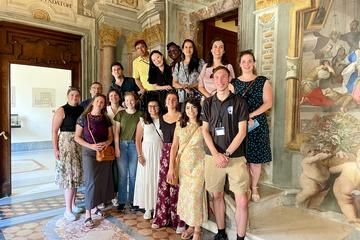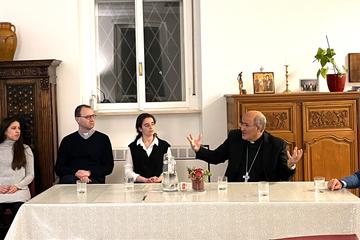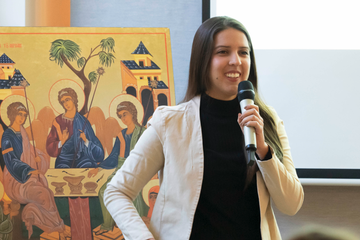In an opportunity to present the work of community members to an external audience, The Lay Centre held an “Open Day on Synodality” Nov. 12. The morning was rich in intellectual dialogue, held among Lay Centre residents and friends. Four scholars gave talks on topics directly or indirectly linked to the theme of synodality. The session was moderated by Loredana Fabijanic, an Angelicum doctoral student from Croatia.
Aljaž Krajnc, a doctoral student of the University of Ljubljana, Slovenia, who is conducting research at the Pontifical Institute for Arabic and Islamic Studies (PISAI), focused his presentation on a single line from the “Document on Human Fraternity for World Peace and Living Together,” a joint statement signed by Pope Francis and the Grand Imam of al-Azhar, Ahmad al-Tayyeb, in Abu Dhabi, United Arab Emirates, in 2019. The document calls for peaceful coexistence and social friendship of all people of faith and is among the inspirations for the papal encyclical “Fratelli Tutti.”
- Maria Teresa Ávila: Lived synodality and the concept of ‘bridge-people’
- Bruno Hermes: The Gospel groups of Amazonia’s Acre River
- Clemency Flitter: Synodality and inclusion in the Church of England
- Adrian Teodor Oancea: Synodality and autocephaly in the Eastern Orthodox Church
- WATCH ALL ‘DIES ACADEMICUS’ LECTURES ON OUR YOUTUBE PAGE
The document says: “The pluralism and the diversity of religions, colour, sex, race and language are willed by God in His wisdom, through which He created human beings.”
This sentence – and in particular the statement that “religious diversity is willed by God” – has caused heated debate, Krajnc noted. The plurality and diversity of religions, colour, sex, race and language are all characteristics of human beings, thus placing the plurality of religions in the context of theological anthropology, Krajnc pointed out.
Furthermore, the document situates these “pluralities” in the context of the divine act of creation and in the context of God’s will and wisdom. One is invited, Krajnc argued, to understand this statement in the context of the creation of a human being. In other words, it means that every single human being is willed by God and, if we want to accept another person, we must accept all of them as they were created.
Being created
Krajnc addressed the question of identity as the departing point of his reflection. “An important part of my identity are the elements without which I would not be myself,” he said. “Those are the parts of my identity that define me the most.”
Krajnc termed this approach as “integral” or “holistic” anthropology, which means that the different characteristics or constitutive elements of an individual cannot be separated from the person, as together they define a person’s identity.
“One of these elements is definitely being human. I am a human being and this defines me. If you were to change this, I would not be myself anymore,” he said. “It is even absurd to think otherwise. I [who am Slovenian] cannot imagine myself being Chinese. I do not want, obviously, to say that I am better because I was raised … in Slovenia. I just want to say that this defines me so much that I would simply become someone else if I were born and raised somewhere else.”
“Another important part of my identity is that I am a Christian,” he continued. “This defines me in a profound way, so profound, that it is almost impossible to understand me without knowing that I am a Christian. I would be someone else if I were not a Christian. I know that if I were born in India, I would most probably be a Hindu. But, alas, I know only one me. And this one was born in Slovenia.”
Like all created beings, “I am created as a whole,” he said, with an “indivisible unity” that is synonymous with having been created as a concrete being. This concreteness means “there are some characteristics of mine that are impossible to be taken away from me,” he added.
“I am Aljaž and as such God wants me,” he said. “My constitutive elements are such an important part of me that I am not myself if you take them from me.”
In meeting other individuals, Krajnc argued, one realises that they, too, were created within a certain human context, with their particular constitutive elements, including their faith and religion.
Accepting another person cannot mean accepting only one part of them, as doing so would mean not truly accepting them, Krajnc said. Part of accepting the other is knowing that their religion is willed by God because it is a constitutive part of that person, he concluded.
Contributed:
Filip Veber
Joseph Tulloch


